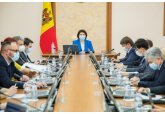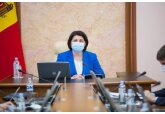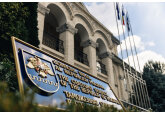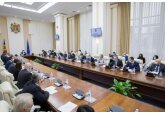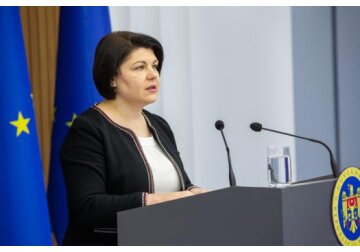
Moldova has asked the IMF to revise the current program and expects an increase in external budget assistance in grants.
This was stated by Prime Minister Natalia Gavrilita at a joint press conference on Friday with the head of the International Monetary Fund Mission Ruben Atoyan. She noted that the Cabinet continues to manage the huge flow of refugees from Ukraine in cooperation with civil society, volunteers, private and international partners. Simultaneously, the government is constantly assessing the risks and consequences of the war in Ukraine on Moldova's economy and the well-being of its citizens. "At the same time, we are developing programs to assist citizens and economic agents in this difficult global context. This week, together with the IMF mission led by Ruben Atoyan, we have evaluated the economic consequences of Ukraine's war, the actions the government considers necessary to reduce the risks and minimize their impact on the economy, as well as budgetary involvement. In the course of these discussions, the government requested that the program with the IMF be revised to reflect the new economic context and ensure a substantial increase in funding from external partners, especially in the form of direct non-reimbursable budget support," Prime Minister said. She noted that the war in Ukraine and economic sanctions against Russia had a serious impact at the global level, which was reflected in the fragmentation of the global economy, disruption of trade and the value chain, high energy and food prices, and price volatility. Natalia Gavrilita reminded that even before the war in Ukraine, Moldova had already suffered from energy and price crises. According to her, a larger flow of refugees from Ukraine and disruption of trade with Ukraine, Russia and Belarus put even more pressure on the Moldovan economy. At the same time, the head of the government noted that Moldova's main macroeconomic indicators remain strong, and the budget has a certain reserve and flexibility. "Responsible and correct economic management in recent months allows only asking for a revision of the current program with the IMF, and not for urgent financing. In this economic context, the government considers it necessary to concentrate further on several important areas. First of all, it is about supporting the population to cope with the price crisis. Next week we will present specific figures on the indexation of pensions from April 1. At the government meeting this Wednesday, we decided to raise the minimum wage in the real sector to 3,500 lei. We will continue policies to improve or maintain the standard of living of citizens," Prime Minister said. She named energy efficiency measures and targeted support mechanisms in conditions of volatility on the energy market as the second important measure. "We have already announced the development of an assistance mechanism for agricultural producers and transport companies, and we are working on mechanisms of targeted support for people with low incomes. We are working on measures to assess energy vulnerability and reform social assistance programs," said Natalia Gavrilita. She called the government's adoption of measures to ensure food security the third important measure. "In the framework of the Emergency Commission, we have taken decisions to temporarily halt exports of wheat, flour, and sugar and facilitate trade with the EU as well as redirect supplies by easing routes, cancelling national certification and other measures. We will continue to monitor the situation and make the additional investments needed in the agricultural sector during this period. Discussions with the IMF will allow us to make forecasts and a framework for discussions, for additional funding from other partners: the EU and other international partners with whom we hold discussions both at the presidential and governmental level," Prime Minister said. // 11.03.2022 – InfoMarket


